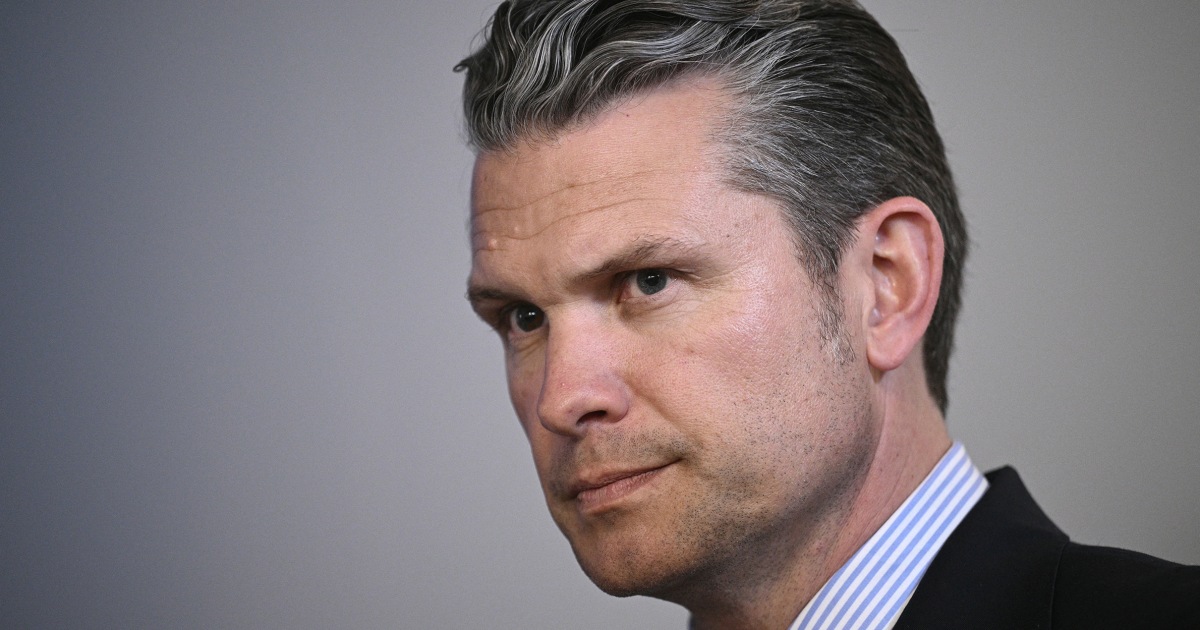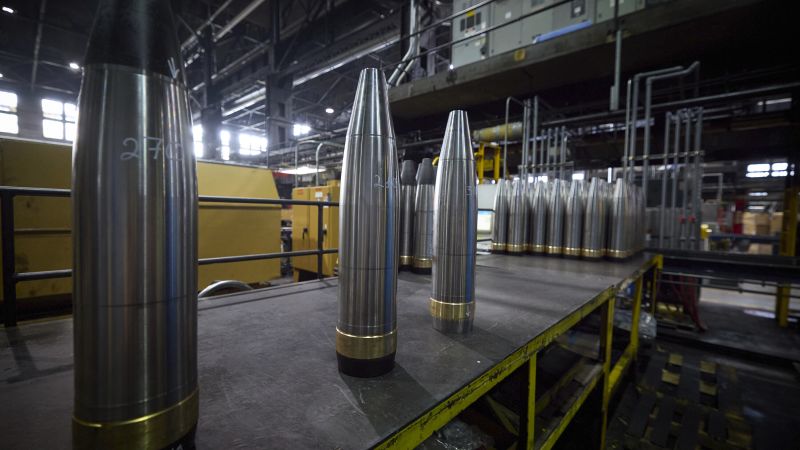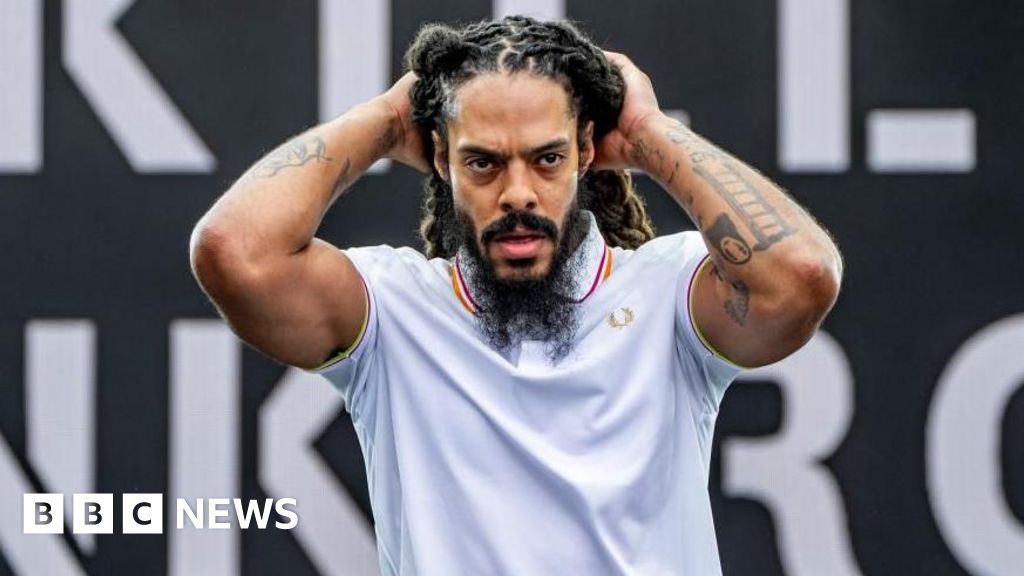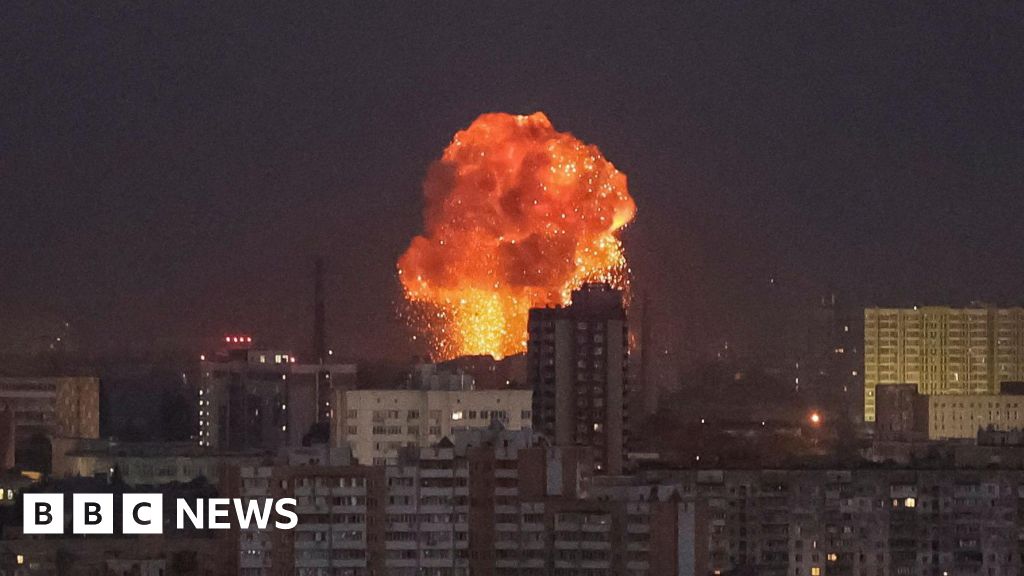Controversy Surrounding Suspension of Military Aid to Ukraine

Introduction
The decision to suspend military aid to Ukraine by Defense Secretary Pete Hegseth has caused controversy and raised questions about the impact on U.S. readiness. According to four sources, the suspension was a unilateral step taken by Hegseth despite military analysis suggesting it would not jeopardize U.S. readiness. This move has drawn comparisons to similar actions taken by both Ukraine and Russia in their ongoing conflict.
Background
In a show of force, Ukraine has carried out large-scale drone strikes against several air bases deep inside Russia, destroying multiple combat planes. The Ukrainian Security Service (SBU) reported that the strikes were part of Operation 'Spiderweb' and were in retaliation for Russia's continued support of separatist groups in eastern Ukraine.
In response, Russia launched deadly drone and missile strikes at multiple targets in Ukraine, killing at least four people in the capital and wounding around 40 others. This escalation of violence comes just days after Ukraine's audacious attack on a Russian bomber fleet, which caused widespread disruption to flights in and out of Moscow.
Current Scenario
The conflict between Ukraine and Russia has also had consequences for other countries, such as the U.S. In fact, Maj. Gen. Mikhail Gudkov, one of the highest-ranking Russian commanders, was recently killed in the war. This has led to the U.S. seeking to pause military aid to Ukraine, which has been met with criticism from some politicians.
The tension between the two countries has also led to hundreds of Ukrainian drones crossing into Russia, targeting Moscow and causing further disruption to flights. This has prompted calls for NATO to intervene and hold a summit to discuss the ongoing situation and determine a course of action.
Meanwhile, President Volodymyr Zelenskyy of Ukraine has called on the U.S. to apply more pressure on Russian President Vladimir Putin in pursuit of peace talks to end the conflict. However, Putin has been accused of 'playing games' with U.S. peace talks and has continued to launch air attacks on Ukraine, resulting in the collapse of two bridges in Russia's western regions bordering Ukraine.
In a separate incident, former Ukrainian politician Andriy Portnov, who worked as an aide to pro-Russian former President Viktor Yanukovych, was shot dead in the Spanish capital Madrid. This further highlights the ongoing tension and violence between the two countries.
Conclusion
The decision to suspend military aid to Ukraine by Defense Secretary Pete Hegseth has sparked controversy and raised concerns about the impact on U.S. readiness. The ongoing conflict between Ukraine and Russia has resulted in deadly drone and missile strikes, as well as the deaths of high-ranking military officials. The situation has also had consequences for other countries, such as the U.S., and has prompted calls for NATO to intervene and hold a summit to address the conflict. The future remains uncertain as both sides continue to engage in aggressive actions, with no clear resolution in sight.
About the People Mentioned
Pete Hegseth
Pete Hegseth is an American government official, author, and former television personality. Born on June 6, 1980, he graduated from Princeton University in 2003 and later earned a master's degree in Public Policy from Harvard University's John F. Kennedy School of Government in 2013[1][4]. Hegseth was commissioned as an infantry officer in the Minnesota Army National Guard, serving in Guantanamo Bay, Iraq, and Afghanistan. He received several military awards, including two Bronze Star Medals and the Combat Infantryman Badge[3][4]. After his military service, Hegseth worked with organizations such as Vets for Freedom and Concerned Veterans for America, where he served as executive director and CEO, respectively[1][7]. He became a contributor to Fox News in 2014 and later co-hosted *Fox & Friends Weekend* from 2017 to 2024[1][5]. Hegseth has written several books, including *American Crusade* and *The War on Warriors*, the latter being a New York Times bestseller[3][5]. In November 2024, Hegseth was nominated by President-elect Donald Trump to be the Secretary of Defense. He faced a contentious confirmation process, with allegations of misconduct and financial issues. Despite these challenges, Hegseth was confirmed by the Senate on January 25, 2025, with Vice President JD Vance casting a tie-breaking vote[1][2]. As Secretary of Defense, Hegseth has been involved in several significant events, including ordering budget cuts and firing top military officers to "focus our military on its core mission"[2]. He has also been at the center of controversy regarding the use of the Signal messaging app for sharing sensitive information[2]. In September 2025, Hegseth addressed senior military leaders, emphasizing the need for tighter fitness standards and opposition to certain policies he termed "woke garbage"[1].
Maj. Gen. Mikhail Gudkov
Major General Mikhail Evgenyevich Gudkov (born January 11, 1983 – died July 2, 2025) was a senior Russian military officer who served as the Deputy Commander-in-Chief of the Russian Navy from March until his death in July 2025 during the Russo-Ukrainian War[2][3][1]. Before his promotion, he commanded the 155th Naval Infantry Brigade of the Pacific Fleet, a unit previously regarded as elite but later notorious for alleged involvement in civilian atrocities during the 2022 Russian invasion of Ukraine[1][3]. Gudkov's military career became controversial due to the 155th Brigade's association with war crimes, notably the massacre in Bucha, a Kyiv suburb where mass civilian killings were discovered after Russian forces withdrew, drawing widespread international condemnation[1]. Additionally, Gudkov was reportedly involved in organizing missile strikes on Ukrainian civilian and military infrastructure using "Iskander" ballistic systems, according to investigations into Russian war crimes in Ukraine[4]. His death was confirmed by the Russian Defense Ministry and occurred during combat operations in the Kursk region near the Ukrainian border on July 2, 2025. Some reports suggested he was killed by a Ukrainian precision strike, but official Russian sources provided limited details beyond confirming his death in active combat[1][3]. Gudkov’s rise to a high-ranking naval position despite his contentious battlefield record highlights the complex dynamics within the Russian military command during the ongoing conflict. His leadership roles and involvement in key military operations mark him as a prominent, albeit controversial, figure in the context of Russia's military actions in Ukraine.
Volodymyr Zelenskyy
Volodymyr Oleksandrovych Zelenskyy, born on January 25, 1978, in Kryvyi Rih, Ukraine, is a Ukrainian politician and former entertainer. He is the sixth president of Ukraine, having taken office in 2019. Before entering politics, Zelenskyy was a well-known comedian, actor, screenwriter, film producer, and director. He graduated with a law degree from Kyiv National Economic University in 2000 but never practiced law. Instead, he co-founded the production company Kvartal 95, which produced films, cartoons, and TV shows, including the popular series "Servant of the People," where he played a fictional Ukrainian president. Zelenskyy's political career began when he announced his candidacy for the 2019 presidential election on New Year's Eve in 2018. He positioned himself as an anti-establishment and anti-corruption figure, which resonated with the public. He won the election with a landslide victory of 73.23% in the second round, defeating incumbent President Petro Poroshenko. Upon taking office, Zelenskyy dissolved the Verkhovna Rada and called for snap elections, which resulted in his party, Servant of the People, gaining an absolute majority in parliament. As president, Zelenskyy has faced significant challenges, including the ongoing conflict with Russia. His leadership during the full-scale Russian invasion of Ukraine, which began in February 2022, has made him a global figure of resistance. He has been recognized for his efforts, including being named Time Magazine's Person of the Year in 2022. Zelenskyy is married to Olena Zelenska and has two children. His presidency has been marked by a strong focus on national unity and international diplomacy to secure support for Ukraine during the ongoing conflict.
Vladimir Putin
Vladimir Putin is the current President of Russia, a position he has held for multiple terms since 2000, with a brief interlude as Prime Minister from 2008 to 2012[1][3]. Born in Leningrad (now Saint Petersburg) in 1952, Putin began his career in the Soviet Union’s security services, joining the KGB in 1975 and rising to the rank of Lieutenant Colonel by the time he left in 1991, following postings in East Germany and Leningrad[4]. After the Soviet Union’s collapse, he transitioned into politics, serving as an adviser to Saint Petersburg Mayor Anatoly Sobchak and later moving to Moscow, where he held various administrative roles under President Boris Yeltsin[6]. Putin was appointed Prime Minister in August 1999 and became acting President when Yeltsin unexpectedly resigned that December[3][6]. He won his first presidential election in March 2000, promising to stabilize Russia’s economy and political system after the tumultuous 1990s[3][7]. During his initial terms, he centralized power, reasserted federal control over Russia’s regions, and curtailed the influence of the country’s oligarchs through legal and economic measures[7]. Putin was re-elected in 2004 but, due to constitutional term limits, stepped aside in 2008, becoming Prime Minister under his successor Dmitry Medvedev, while retaining significant influence[3]. Constitutional amendments later extended presidential terms, and Putin returned to the presidency in 2012[1]. Putin’s time in office has been marked by assertive foreign policy, including military interventions in Syria in support of President Bashar al-Assad and the 2014 annexation of Crimea, which led to international sanctions[1]. Domestically, his tenure has seen increased state control over media, the suppression of political opposition, and constitutional changes consolidating executive authority[1]. In 2022, Russia’s full-scale invasion of Ukraine triggered a major international crisis, further isolating Russia from the West and prompting widespread condemnation[1]. As of 2025, Putin remains a dominant figure in Russian politics, having secured another term in office through constitutional changes that allow him to potentially remain president until 2036[1]. His leadership continues to shape Russia’s domestic trajectory and its role in global affairs, amid ongoing conflict in Ukraine and strained relations with NATO and Western countries[1].
Andriy Portnov
Andriy Portnov was a Ukrainian lawyer and politician, best known for his controversial role as a key figure in the administration of former President Viktor Yanukovych. Born on October 27, 1973, in Voroshylovhrad (now Luhansk), Portnov began his career in law at the State Commission on Securities before moving to Kyiv in the late 1990s[1][2]. He was elected to the Ukrainian parliament in 2006 as a member of the Yulia Tymoshenko Bloc, where he headed the legal department and defended Tymoshenko’s interests in court[1][2]. However, after Tymoshenko’s defeat in the 2010 presidential election, Portnov switched allegiances to join Yanukovych’s camp, a move that alienated many former allies[1][4]. As deputy head of Yanukovych’s presidential administration from 2010 to 2014, Portnov oversaw judicial reforms and was responsible for the main department for the judiciary[1][4]. He played a central role in drafting and promoting the 2012 Criminal Procedure Code, which was criticized for enabling political persecution and weakening judicial independence[1][4]. During this period, Portnov was widely seen as instrumental in subordinating Ukraine’s courts to presidential control, a legacy that has had lasting negative effects on the country’s judicial system[4]. He was also involved in controversial legislative moves, including the so-called “laws of January 16,” aimed at suppressing the 2014 Euromaidan protests[3]. After Yanukovych was ousted in February 2014, Portnov fled Ukraine, first to Russia and later to Austria[2][3]. He faced multiple investigations and was subject to sanctions by both Ukraine and the European Union, though these were later dropped[3]. Despite his exile, Portnov remained a polarizing figure, maintaining informal influence over segments of Ukraine’s judiciary and legal community[6]. He returned to Ukraine some years later, re-establishing himself as a prominent lawyer before relocating abroad again[6]. On May 21, 2025, Andriy Portnov was shot dead in Madrid, Spain, at the age of 51[1][3][6]. The killing, which occurred outside the American School of Madrid, drew international attention due to his contentious political history and ongoing relevance in Ukrainian legal and political circles[3][6]. Portnov’s career exemplifies the intertwining of law, politics, and power in post-Soviet Ukraine, and his death marks the end of a chapter for one of the country’s most controversial legal figures[1][4].
Viktor Yanukovych
Viktor Fedorovych Yanukovych, born July 9, 1950, in Yenakiieve, Donetsk Oblast, is a Ukrainian politician who served as Prime Minister of Ukraine (2002–2005, 2006–2007) and as the country’s fourth President (2010–2014)[1][2][4]. His political career was closely associated with eastern Ukraine’s industrial heartland and the pro-Russian Party of Regions, which he led from 2003[3][5]. Yanukovych’s rise from a working-class background—marked by a troubled youth that included two convictions for violent crimes—to national leadership was notable for its rapid ascent through regional administration and industrial management before entering national politics[3][4]. Yanukovych first gained prominence during the 2004 presidential election, which he initially won amid widespread allegations of fraud. Massive protests, known as the Orange Revolution, led to a Supreme Court-ordered revote, which he lost to Viktor Yushchenko[1][5]. Despite this setback, Yanukovych remained a leading opposition figure and, capitalizing on public discontent with economic hardship and political infighting, won the 2010 presidential election, defeating Yulia Tymoshenko[3][6]. His presidency was marked by efforts to balance relations between the European Union and Russia, including signing an agreement to extend Russia’s lease on naval bases in Crimea in exchange for discounted gas[6]. He also oversaw Ukraine’s commitment to nuclear nonproliferation by relinquishing stocks of highly enriched uranium[6]. However, his administration faced criticism for the politically motivated prosecution of Tymoshenko and for perceived democratic backsliding[6]. Yanukovych’s presidency ended abruptly in February 2014 amid the Euromaidan protests, sparked by his rejection of an EU association agreement in favor of closer ties with Russia. After security forces killed dozens of protesters, he was impeached by parliament and fled to Russia[2][4][5]. In absentia, he was later found guilty of treason by Ukrainian courts and declared wanted by Interpol[1]. Since his ouster, Yanukovych has lived in exile in Russia, with no significant political role in Ukraine. His tenure and dramatic exit remain central to discussions of Ukraine’s post-Soviet political trajectory, the 2014 Revolution of Dignity, and the subsequent Russian annexation of Crimea and war in Donbas. While occasionally referenced in geopolitical analyses, especially regarding Russia’s influence in Ukraine, Yanukovych himself is not an active participant in current Ukrainian politics[2][6].
About the Organizations Mentioned
US Defense Department
The United States Department of Defense (DoD) is the federal executive department charged with ensuring national security and overseeing the U.S. military forces. Established in 1947 by the National Security Act, it unified the previously separate War and Navy Departments and created the Air Force as a coequal military branch to improve coordination and effectiveness following World War II[5]. The DoD is headquartered in the Pentagon and is led by the Secretary of Defense, a cabinet-level official who reports directly to the president, the commander-in-chief of the armed forces[1]. The DoD encompasses three military departments: the Army, the Navy (including the Marine Corps), and the Air Force (including the Space Force). These departments manage doctrine, training, personnel, and equipment, while operational control is exercised through eleven unified combatant commands responsible for executing missions worldwide[1][3]. The department also supervises key intelligence agencies such as the Defense Intelligence Agency and the National Security Agency, along with specialized organizations like DARPA, which drives advanced research and technological innovation[1]. With over 1.4 million active-duty personnel, hundreds of thousands of reservists and civilians, and a budget exceeding $500 billion, the DoD operates a vast global infrastructure including thousands of facilities, aircraft, and ships[1][2]. Its mission spans warfighting, deterrence, humanitarian aid, disaster relief, peacekeeping, and homeland security, supported by strategic goals including defeating adversaries, sustaining readiness, and fostering innovation[2]. Notable for its scale and technological prowess, the DoD is a major driver of defense-related R&D and a significant player in the global defense industry. It integrates military operations with cutting-edge technology development and logistical management to maintain U.S. military dominance and national security in a complex geopolitical environment[2][3][5]. In summary, the U.S. Department of Defense is a crucial institution that combines military power, strategic planning, and technological innovation to fulfill its mandate of protecting the United
Ukrainian Security Service (SBU)
The **Security Service of Ukraine (SBU)** is Ukraine’s primary intelligence, law enforcement, and internal security agency, responsible for protecting the state against internal and external threats such as terrorism, espionage, organized crime, and corruption. It also handles counterintelligence, counter-terrorism, and the personal security of key state officials including the President and Parliament. The SBU reports directly to the President of Ukraine and operates under a special legal status within the executive branch[2][3]. The SBU was officially established in 1991 as the successor to the Ukrainian branch of the Soviet KGB following Ukraine’s independence. It inherited much of the Soviet-era personnel and structures, which influenced its early operations. Throughout the 1990s and early 2000s, the agency faced challenges including corruption, abuses of power such as blackmail and secret detention, and accusations of collusion with Russian security services. These issues sometimes undermined its effectiveness and public trust[1][2][4]. Despite this troubled history, the SBU has played a critical role in Ukraine’s national security, especially during periods of geopolitical tension and conflict, such as after the 2014 Maidan Revolution and ongoing confrontations with Russia. It has thwarted foreign espionage efforts and disrupted illegal arms trafficking and other crimes that threaten state stability. The agency also oversees specialized units like the Alfa Group, which conducts tactical counter-terrorism operations[2][3][4]. In recent years, Ukrainian leadership has pursued reforms to modernize the SBU, aiming to reduce corruption, increase transparency, and improve its alignment with democratic principles and rule of law. These reforms are ongoing and critical as Ukraine faces complex security challenges in the regional and technological domains[4][6]. Notably, the SBU combines a legacy of Soviet-era intelligence practices with ongoing efforts at transformation, making it a pivotal institution in Ukraine’s security architecture and its broader efforts to assert sovereignty and technological resilience in a turbulent geopolitical environment[3][
NATO
The **North Atlantic Treaty Organization (NATO)** is a transatlantic military alliance founded in 1949 to secure peace in Europe and protect democratic nations from Soviet aggression. It began with 12 founding members and has expanded to include 32 countries across North America and Europe as of 2025, including recent additions Finland (2023) and Sweden (2024)[1][3]. NATO's core principle is collective defense, meaning an attack against one ally is considered an attack against all, enshrined in Article 5 of its founding treaty[3]. Originally established as a Cold War bulwark, NATO has evolved beyond its initial Euro-Atlantic focus, engaging in missions worldwide, such as in Afghanistan and Libya[1]. The alliance remains central to U.S.-Europe military cooperation and has adapted to new security challenges, particularly Russia’s 2022 invasion of Ukraine, which has significantly reshaped NATO’s priorities. This aggression has spurred increased defense spending, stronger collective deterrence efforts, and accelerated Ukraine’s path toward potential membership[1][4]. In June 2025, NATO held its first summit in the Netherlands, where leaders agreed on raising defense spending targets to 5% of GDP—split between 3.5% for core defense and 1.5% for related security costs, including support for Ukraine. This marked a historic commitment to bolster the alliance’s military capabilities amid evolving global threats. The summit also emphasized eliminating defense trade barriers and reaffirmed the ironclad commitment to collective defense[2][5]. NATO’s ongoing significance lies in its role as a strategic security platform fostering cooperation among member states, responding to geopolitical instability, and adapting to emerging threats like terrorism and cyber warfare[4]. Its "open door" policy continues to invite eligible European democracies to join, reinforcing its mission to safeguard peace, democracy, and shared technological and defense innovations across allied nations[1][4].

















